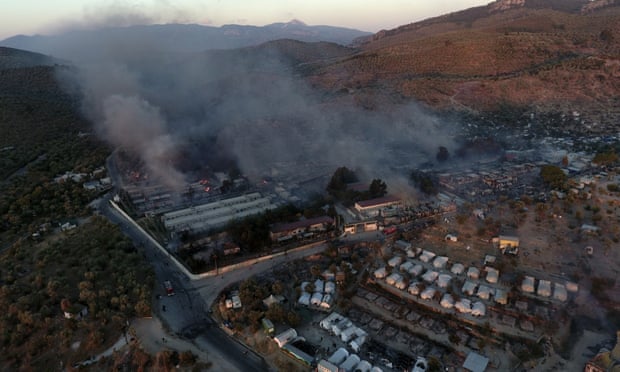Jailing of Afghans for Lesbos migrant camp fire a ‘parody of justice’
Lawyers criticise 10-year terms given to four asylum seekers, saying three should have been tried in juvenile court.
Draconian prison sentences handed down to four Afghan youths found guilty of starting the fire that destroyed the Moria migrant camp on the Greek island of Lesbos last year have been described as a “parody of justice”.
Defence lawyers called the penalties “unfair”, saying three of the accused were under the age of 18 at the time and should have been tried before a juvenile court. The asylum seekers received 10-year jail terms each.
“They were given the maximum sentences possible without the court recognising any mitigating circumstance,” said Patrikios Patrikounakis, among the lawyers handling the case. “Their age should have been taken into account according to the Greek penal code. What we saw, instead, was a parody of justice,” he told the Guardian.
A three-member tribunal convening on the Aegean island of Chios announced the verdict after a two-day hearing on Saturday. Neither international observers, nor the media, were allowed to attend the proceedings after the judge closed the courtroom citing Covid-19 restrictions.
The Afghans were convicted of arson, endangering human life and destruction of property nine months after blazes gutted the camp, then Europe’s biggest holding centre and infamous for living conditions described as squalid and inhumane.
The four, among more than 13,000 asylum seekers in Moria at the time, are expected to return to Avlona, a prison for young offenders, outside Athens where they were detained pending trial.
In an earlier hearing in March, two other Afghan youths were sentenced to five-year jail terms.
The fires did not cause casualties but for days afterwards thousands of men, women and children were forced to live rough in Lesbos until the construction of an emergency temporary settlement close to Mytilene, the island’s port capital.
Authorities believe the blazes were intentionally ignited by camp occupants after lockdown measures were imposed following the discovery of Covid-19 cases in the facilities.
The defence immediately appealed against the verdict, with lawyers saying, if needed, they would take the case to the European court of human rights.
The charges against the four were based on the testimony of another Afghan asylum seeker who has since gone missing and did not appear in court. The defendants have claimed they were deliberately framed by the witness, an ethnic Pashtun, arguing that all six belong to the persecuted Hazara minority in Afghanistan.
Standing outside the Chios courthouse, defence lawyers criticised the judgment, calling it “an absurd conviction without evidence.”
It was outrageous, they said, that their request for the trial to be heard before a juvenile court had been rejected. “We will extinguish all the legal remedies for these people to get a fair trial,” said Efi Doussi one of the attorneys. “Justice is for all, independent of ethnic origin, race or religion.”
Echoing his colleagues, Patrikounakis called the verdict pre-ordained. “It had clearly come from on high and was a state decision,” he said. “Before an investigation had even got under way government ministers were calling for convictions.”
Greece has been at the sharp end of the refugee crisis since Syria’s civil war. But Aegean islands, long on the frontline of immigration flows, have witnessed a dramatic drop in arrivals since 2020.The centre-right government in Athens has made concerted efforts over the past year to decongest islands that had become holding stations for thousands of asylum seekers as part of a broader EU scheme of containing migrants at the continent’s borders.
Despite opposition from locals Athens has announced it will replace anarchic open-air camps with closed, state-of the-art facilities for refugees on Lesbos, Chios, Samos, Leros and Kos.
Government officials have also acknowledged that Moria was unfit for purpose. “It was a national shame. In many ways it was a good thing that it burned down,” one senior official said.

